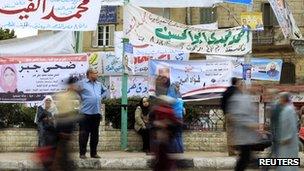Egypt votes: 'More candidates than actors'
- Published

As Egyptians head to the polls to elect a new parliament, the BBC's Yolande Knell has been to meet voters in an eastern suburb of Cairo.
Waiting at the traffic lights at Roxy Square in Heliopolis there is plenty for local drivers to take in.
Dozens of political campaign posters are on display, stuck on walls and strung from lamp-posts and railings.
The competition for space is not surprising.
In this electoral district, there are 96 individual candidates taking part - classed as workers or farmers and professionals - and 17 party lists.
It all adds up to a very complicated, slightly confusing picture.
"I need someone to tell me who to vote for. I am at a complete loss," jokes Mohammed Sayyid.
"I don't know the political programmes of everyone in this constituency. We have more candidates than there are actors and actresses in Egypt."
But on the main shopping streets, most people I meet are planning to vote.
For many this is the great achievement of this year's uprising that overthrew President Hosni Mubarak who had been in power for three decades.
A 62-year-old man tells me he is excited to be participating in an election for the first time.
"Now you can give your voice. It's not like before the 25 January Revolution," he says. "You're really free."
Security fears
Ongoing protests a few kilometres away in central Cairo have dampened such feelings.
Activists are demanding an immediate transfer from military rule to a national salvation government.
One prominent liberal candidate, political activist, Asmaa Mahfouz has been prompted to drop out of the Heliopolis race.
"Legally, I cannot withdraw right now," she wrote on Twitter. "I won't go to any polls or send representatives, I will be in Tahrir Square continuing our sit-in."
Other well-known candidates - the blogger Mahmoud Salim or "Sandmonkey" and the intellectual Amr Hamzawy - have called for the first round of the vote to be postponed.
However, local backing for the Muslim Brotherhood - Egypt's most powerful political force - does not seem to have been dented by its insistence that elections should go on.
The Islamist group was officially banned for over 50 years, but was recently legalised and allowed to set up its own party called Freedom and Justice.
Previously, its members did well as independent candidates running in this constituency.
"I'm a supporter of Freedom and Justice," says Ahmed Ashraf. "I know the candidates and that's why they will get my vote. God willing, they will do well."
"The majority of people here will vote for the Freedom and Justice party," a passer-by predicts. "People in Heliopolis think they're good men."
A lot of Heliopolis residents have security concerns. They point out that they have never known a vote free of harassment and violence and that this time the stakes are higher than ever before.
"We will have troubles for sure, in every election there are troubles," Safaa tells me. "I don't know how we can stop it."
Many voters say they have been having lively debates among their friends and families about how best to exercise their democratic right.
There are hopes that there will be co-operation between those with different political leanings to ensure a free and fair vote.
Earlier this month, 10 candidates in the district signed their own code of ethics.
Armed forces have been deployed to help policing, particularly around polling stations over the two days of elections.
Whatever result they finally bring, Egyptians here, as elsewhere, are hoping it will lead to greater stability.
- Published27 November 2011
- Published25 November 2011
- Published23 November 2011